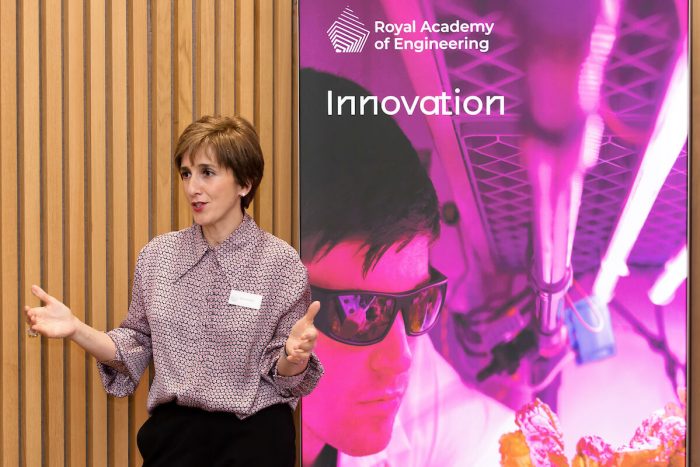Member Profile: Ana Avaliani, The Royal Academy of Engineering

Ana Avaliani is the Director of Enterprise at the Royal Academy of Engineering leading the Academy’s global entrepreneurship and commercialisation programme portfolio.
How does the Enterprise Hub help its founders? What are they looking for in applicants? Ana outlines the programs the Academy offers and how it is shaping the next generation of engineering excellence.
The beginning
I started my career in a telecommunications startup focusing on technology scouting, finding and implementing novel technologies. I have extensive experience in innovation management in the UK and internationally. Prior to joining the Academy, I worked at PA Consulting Group, leading on high profile projects including the setup of a Tech Hub in Lebanon, Beirut. I am also a Senior Enterprise Fellow at the University of Strathclyde.
I joined the Academy at the end of 2015 when the Enterprise Hub was itself a ‘startup’ with just three team members and a small portfolio of mainly spinout companies. Since then we have grown our programme offering, which now supports over 150 entrepreneurs and innovators in the UK and internationally on an annual basis and have rolled out a network of Enterprise Hubs across the UK. You will find us in Belfast (Northern Ireland), Glasgow (Scotland), Swansea (Wales), Liverpool and Newcastle (England). We have been named as the 9th best accelerator in Europe by the Financial Times and Statista.
Some of our portfolio companies include Paragraf, Holierm, Purafinity, nPlan and Gravity Sketch.
What is the role of the Enterprise Hub within the Royal Academy’s programs?
As the UK’s national academy of engineering and technology, our overarching goal is to harness the power of engineering to build a sustainable society and an inclusive economy that works for everyone. Talent and Diversity, Policy and Engagement, and Innovation are our three key themes.
The Enterprise Hub programmes play a key role in driving innovation. We do this by supporting talented entrepreneurs and decision makers to turn their breakthrough engineering and scientific innovations into disruptive spinouts, startups and scaleups. We look for bold, IP-rich innovations from all areas of engineering and technology that can help to solve the world’s most complex environmental, economic and social challenges. A full list of our programmes can be found on our website.
What are the biggest challenges you’ve observed for engineering startups in scaling their technologies, and how does the Enterprise Hub address these?
Access to finance, infrastructure and talent are some of the key challenges facing engineering and technology startups and scaleups. There are two ways to look at how we address these challenges.
On one hand, we are able to connect our portfolio companies to the Academy’s global network of investors and key ecosystem players to unlock opportunities for them through introductions to investors, talented professionals or service providers. In collaboration with Imperial College London, we have just launched a new programme, Science and Technology Venture Capital Fellowships, to enhance investor capability in identifying and deploying capital into high potential, scalable, deep tech ventures.
On the other hand, we work closely with policy makers to provide them with impartial, evidence-based advice to help create a more conducive environment for engineering and technology entrepreneurs to thrive in the UK. Some of our policy work includes Spotlight on Spinouts and the Quantum Infrastructure Review, We also host roundtables involving our portfolio companies to enable civil servants and government ministers to hear about the challenges faced by the entrepreneurs we work with.
What emerging technology trends are you most excited about, and how is the Hub positioning itself to support innovations in these areas?
Through our work with early stage deep tech founders we see some really exciting technologies that are showing immediate potential for significant impact and, in some cases, rapid deployment.
Personally, I am most excited about brain–computer interfaces, autonomous vehicles (not just cars but other modes of transport) and the innovation in telecoms, ubiquitous connectivity and data exchange between devices. As a team that supports deep tech engineering and technology founders, we have the knowledge, networks, track record and the know-how to provide best-in-class support to innovators.
What advice would you give to engineering founders looking to secure investment and scale their businesses?
Most of our portfolio companies that are successful in securing the funding and scaling their business tend to display the following characteristics:
- They have a clear vision for their company and the passion to pursue it relentlessly.
- They are empathetic leaders with the ability to motivate and inspire their teams.
- They are adaptive decision makers who can make tough choices quickly, learning and adjusting rapidly.
- They are able to use our network to do super due diligence on the investors they’d like to approach for funding and seek warm introductions to these firms.

